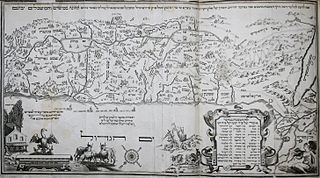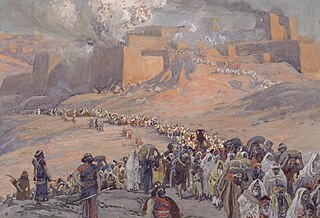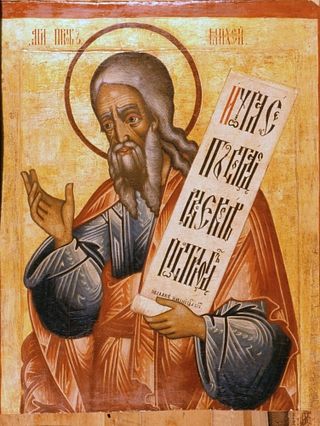The topic of this article may not meet Wikipedia's general notability guideline .(November 2018) |
The Zarhites were a branch of the tribe of Judah descended from Zerah, the son of Judah. [1] [2]
The topic of this article may not meet Wikipedia's general notability guideline .(November 2018) |
The Zarhites were a branch of the tribe of Judah descended from Zerah, the son of Judah. [1] [2]
The Book of Micah is the sixth of the twelve minor prophets in the Hebrew Bible. Ostensibly, it records the sayings of Micah, whose name is Mikayahu, meaning "Who is like Yahweh?", an 8th-century BCE prophet from the village of Moresheth in Judah.

David was, according to the Hebrew Bible, the third king of the United Kingdom of Israel. Historians of the Ancient Near East agree that David probably lived c. 1000 BCE, but little more is known about him as a historical figure.

The history of ancient Israel and Judah begins in the Southern Levant region of Western Asia during the Late Bronze Age and Early Iron Age. The earliest known reference to "Israel" as a people or tribal confederation is in the Merneptah Stele, an inscription from ancient Egypt that dates to about 1208 BCE, but the people group may be older. According to modern archaeology, ancient Israelite culture developed as an outgrowth from the pre-existing Canaanite civilization. Two related Israelite polities known as the Kingdom of Israel (Samaria) and the Kingdom of Judah had emerged in the region by Iron Age II.

Hezekiah, or Ezekias, was the son of Ahaz and the 13th king of Judah according to the Hebrew Bible.

Isaiah was the 8th-century BC Israelite prophet after whom the Book of Isaiah is named.

Jeroboam I was, according to the Hebrew Bible, the first king of the northern Kingdom of Israel following a revolt of the ten tribes against Rehoboam that put an end to the United Monarchy.

The Kingdom of Judah was a Hebrew-speaking kingdom of the Southern Levant during the Iron Age. Centered in the highlands of Judea, the landlocked kingdom's capital was Jerusalem. Jews are named after Judah and are primarily descended from it.

The Kingdom of Israel, or the Kingdom of Samaria, was an Israelite kingdom in the Southern Levant during the Iron Age, whose beginnings can be dated back to the first half of the 10th century BCE. The kingdom controlled the areas of Samaria, Galilee and parts of Transjordan. The regions of Samaria and Galilee underwent a period with large number of settlements during the 10th century BCE, with the capital in Shechem, and then in Tirzah. The kingdom was ruled by the Omride dynasty in the 9th century BCE, whose political center was the city of Samaria.
Zephaniah is the name of several people in the Hebrew Bible; the most prominent being the prophet who prophesied in the days of Josiah, king of Judah and is attributed a book bearing his name among the Twelve Minor Prophets. His name is commonly transliterated Sophonias in Bibles translated from the Vulgate or Septuagint. The name might mean "Yah has concealed", "[he whom] Yah has hidden", or "Yah lies in wait".

The Israelites were a group of Semitic-speaking tribes in the ancient Near East who, during the Iron Age, inhabited a part of Canaan.

The Babylonian captivity or Babylonian exile is the period in Jewish history during which a large number of Judeans from the ancient Kingdom of Judah were captives in Babylon, the capital city of the Neo-Babylonian Empire, following their defeat in the Jewish–Babylonian War and the destruction of Solomon's Temple in Jerusalem. The event is known to be historical, and is described in archaeological and extra-biblical sources, in addition to the Hebrew Bible.

According to the Hebrew Bible, the tribe of Judah was one of the twelve Tribes of Israel, named after Judah, the son of Jacob. Judah was the first tribe to take its place in the Land of Israel, occupying the southern part of the territory. Jesse and his sons, including King David, belonged to this tribe.
Onan was a figure detailed in the Book of Genesis chapter 38, as the second son of Judah who married the daughter of Shuah the Canaanite. Onan had an older brother Er and a younger brother, Shelah as well. After being commanded by his father, Judah, to perform his duty as a husband's brother according to the custom of levirate marriage with the late Er's wife Tamar, Onan instead refused to perform his duty as a levirate and "spilled his seed on the ground whenever he went in" because "the offspring would not be his", and was thus put to death by Yahweh. This act is detailed as retribution for being "displeasing in the sight of Lord". Onan's crime is often misinterpreted to be masturbation but it is universally agreed among biblical scholars that Onan's death is attributed to his refusal to fulfill his obligation of levirate marriage with Tamar by committing coitus interruptus.

Judah was, according to the Book of Genesis, the fourth of the six sons of Jacob and Leah and the founder of the Tribe of Judah of the Israelites. By extension, he is indirectly the eponym of the Kingdom of Judah, the land of Judea, and the word Jew.

The Davidic line or House of David is the lineage of the Israelite king David. In Judaism it is based on texts from the Hebrew Bible and through the succeeding centuries based on later traditions. In Christianity, the New Testament follows the line through Mary and Joseph to Jesus.

According to the Deuteronomistic history in the Hebrew Bible, a United Monarchy or United Kingdom of Israel existed under the reigns of Saul, Eshbaal, David, and Solomon, encompassing the territories of both the later kingdoms of Judah and Israel.

The Twelve Tribes of Israel are, according to Hebrew scriptures, the descendants of the biblical patriarch Jacob, who collectively form the Israelite nation. The tribes were through his twelve sons through his wives, Leah and Rachel, and his concubines, Bilhah and Zilpah. In modern scholarship, there is skepticism as to whether there ever were twelve Israelite tribes, with the use of the number 12 thought more likely to signify a symbolic tradition as part of a national founding myth, although some scholars disagree with this view.

According to the Hebrew Bible, Micah, also known as Micheas, was a prophet in Judaism and is the author of the Book of Micah. He is considered one of the Twelve Minor Prophets of the Hebrew Bible and was a contemporary of the prophets Isaiah, Amos and Hosea. Micah was from Moresheth-Gath, in southwest Judah. He prophesied during the reigns of kings Jotham, Ahaz, and Hezekiah of Judah.

The origins of Judaism lie in Bronze Age polytheistic Canaanite religion. Judaism also syncretized elements of other Semitic religions such as Babylonian religion, which is reflected in the early prophetic books of the Hebrew Bible.

The kings of the United Kingdom of Israel, as well as those of its successor states and classical period kingdoms ruled by the Hasmonean dynasty and Herodian dynasty, are as follows: